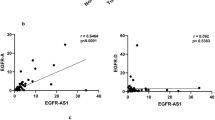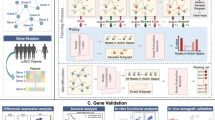Abstract
The epidermal growth factor (EGF) gene encodes a growth factor that binds to the EGF receptor (EGFR), which is involved in activating pathways that promote cellular proliferation, survival, migration and differentiation, and lack of control is characteristic of malignant development. Previous studies showed that serum EGF levels may influence the risk of cancer. In this study, we genotyped the EGF G61A polymorphism (rs4444903) and measured serum EGF levels using an enzyme immunoassay in a hospital-based case–control study of 345 patients with diagnosed renal cell carcinoma (RCC) and 346 cancer-free controls in a Chinese population. Compared with the EGF 61GG genotype, the AA genotype had a significantly increased RCC risk (odds ratio=1.80, 95% confidence interval=1.04–3.12). Besides, the mean serum EGF levels in RCC patients (858.94±391.54 pg ml–1) were significantly lower than those in controls (1281.52±568.42 pg ml–1, P<0.001). In addition, individuals carrying AA genotype had lower serum EGF levels than GA or GG carriers. These results suggested that the EGF G61A polymorphism is involved in the etiology of RCC and thus may be a marker for genetic susceptibility to RCC in Chinese populations. Larger studies are warranted to validate our findings.
Similar content being viewed by others
Log in or create a free account to read this content
Gain free access to this article, as well as selected content from this journal and more on nature.com
or
References
Jemal, A., Siegel, R., Ward, E., Hao, Y., Xu, J. & Thun, M. J. Cancer statistics, 2009. CA Cancer J. Clin. 59, 225–249 (2009).
Yang, L., Parkin, D. M., Ferlay, J., Li, L. & Chen, Y. Estimates of cancer incidence in China for 2000 and projections for 2005. Cancer Epidemiol. Biomarkers Prev. 14, 243–250 (2005).
Lipworth, L., Tarone, R. E. & McLaughlin, J. K. The epidemiology of renal cell carcinoma. J. Urol. 176, 2353–2358 (2006).
Setiawan, V. W., Stram, D. O., Nomura, A. M., Kolonel, L. N. & Henderson, B. E. Risk factors for renal cell cancer: the multiethnic cohort. Am. J. Epidemiol. 166, 932–940 (2007).
Hunt, J. D., van der Hel, O. L., McMillan, G. P., Boffetta, P. & Brennan, P. Renal cell carcinoma in relation to cigarette smoking: meta-analysis of 24 studies. Int. J. Cancer 114, 101–108 (2005).
Normanno, N., De Luca, A., Bianco, C., Strizzi, L., Mancino, M., Maiello, M. R. et al. Epidermal growth factor receptor (EGFR) signaling in cancer. Gene 366, 2–16 (2006).
Laurence, D. J. & Gusterson, B. A. The epidermal growth factor. A review of structural and functional relationships in the normal organism and in cancer cells. Tumour Biol. 11, 229–261 (1990).
Carpenter, G. & Cohen, S. Epidermal growth factor. J. Biol. Chem. 265, 7709–7712 (1990).
Shahbazi, M., Pravica, V., Nasreen, N., Fakhoury, H., Fryer, A. A., Strange, R. C. et al. Association between functional polymorphism in EGF gene and malignant melanoma. Lancet 359, 397–401 (2002).
Amend, K. L., Elder, J. T., Tomsho, L. P., Bonner, J. D., Johnson, T. M., Schwartz, J. et al. EGF gene polymorphism and the risk of incident primary melanoma. Cancer Res. 64, 2668–2672 (2004).
McCarron, S. L., Bateman, A. C., Theaker, J. M. & Howell, W. M. EGF +61 gene polymorphism and susceptibility to and prognostic markers in cutaneous malignant melanoma. Int. J. Cancer 107, 673–675 (2003).
Goto, Y., Ando, T., Goto, H. & Hamajima, N. No association between EGF gene polymorphism and gastric cancer. Cancer Epidemiol. Biomarkers Prev. 14, 2454–2456 (2005).
Hamai, Y., Matsumura, S., Matsusaki, K., Kitadai, Y., Yoshida, K., Yamaguchi, Y. et al. A single nucleotide polymorphism in the 5′ untranslated region of the EGF gene is associated with occurrence and malignant progression of gastric cancer. Pathobiology 72, 133–138 (2005).
Wang, Y., Tian, T., Hu, Z., Tang, J., Wang, S., Wang, X. et al. EGF promoter SNPs, plasma EGF levels and risk of breast cancer in Chinese women. Breast Cancer Res. Treat. 111, 321–327 (2008).
Lanuti, M., Liu, G., Goodwin, J. M., Zhai, R., Fuchs, B. C., Asomaning, K. et al. A functional epidermal growth factor (EGF) polymorphism, EGF serum levels, and esophageal adenocarcinoma risk and outcome. Clin. Cancer Res. 14, 3216–3222 (2008).
Olayioye, M. A., Neve, R. M., Lane, H. A. & Hynes, N. E. The ErbB signaling network: receptor heterodimerization in development and cancer. EMBO J. 19, 3159–3167 (2000).
Normanno, N., Bianco, C., Strizzi, L., Mancino, M., Maiello, M. R., De Luca, A. et al. The ErbB receptors and their ligands in cancer: an overview. Curr. Drug Targets 6, 243–257 (2005).
Tomaszewski, J., Miturski, R. & Kotarski, J. [Concentration of epidermal growth factor (EGF) in serum of women with endometrial cancer]. Ginekol. Pol. 67, 248–253 (1996).
Wells, A. EGF receptor. Int. J. Biochem. Cell Biol. 31, 637–643 (1999).
Singh, A. B. & Harris, R. C. Autocrine, paracrine and juxtacrine signaling by EGFR ligands. Cell Signal 17, 1183–1193 (2005).
Salazar, G. & Gonzalez, A. Novel mechanism for regulation of epidermal growth factor receptor endocytosis revealed by protein kinase A inhibition. Mol. Biol. Cell 13, 1677–1693 (2002).
Friedman, L. M., Rinon, A., Schechter, B., Lyass, L., Lavi, S., Bacus, S. S. et al. Synergistic down-regulation of receptor tyrosine kinases by combinations of mAbs: implications for cancer immunotherapy. Proc. Natl Acad. Sci. USA 102, 1915–1920 (2005).
Zhao, X., Dai, W., Zhu, H., Zhang, Y., Cao, L., Ye, Q. et al. Epidermal growth factor (EGF) induces apoptosis in a transfected cell line expressing EGF receptor on its membrane. Cell Biol. Int. 30, 653–658 (2006).
Jin, G., Miao, R., Deng, Y., Hu, Z., Zhou, Y., Tan, Y. et al. Variant genotypes and haplotypes of the epidermal growth factor gene promoter are associated with a decreased risk of gastric cancer in a high-risk Chinese population. Cancer Sci. 98, 864–868 (2007).
Kang, S., Kim, J. W., Park, N. H., Song, Y. S., Park, S. Y. Kang, S. B. et al. Epidermal growth factor 61 A/G polymorphism and uterine cervical cancer. Int. J. Gynecol. Cancer 17, 492–496 (2007).
Randerson-Moor, J. A., Gaut, R., Turner, F., Whitaker, L., Barrett, J. H., Silva Idos, S. et al. The relationship between the epidermal growth factor (EGF) 5′UTR variant A61G and melanoma/nevus susceptibility. J. Invest. Dermatol. 123, 755–759 (2004).
James, M. R., Hayward, N. K., Dumenil, T., Montgomery, G. W., Martin, N. G. & Duffy, D. L. Epidermal growth factor gene (EGF) polymorphism and risk of melanocytic neoplasia. J. Invest. Dermatol. 123, 760–762 (2004).
Acknowledgements
This study was supported by the Foundation of Medical Key Department of Jiangsu Province–Department of Urology of Jiangsu Province Hospital (BK2008473).
Author information
Authors and Affiliations
Corresponding authors
Rights and permissions
About this article
Cite this article
Zhu, J., Meng, X., Yan, F. et al. A functional epidermal growth factor (EGF) polymorphism, EGF serum levels and renal cell carcinoma risk in a Chinese population. J Hum Genet 55, 236–240 (2010). https://doi.org/10.1038/jhg.2010.12
Received:
Revised:
Accepted:
Published:
Issue date:
DOI: https://doi.org/10.1038/jhg.2010.12
Keywords
This article is cited by
-
Decreased macrophage inflammatory protein (MIP)‐1α and MIP‐1β increase the risk of developing nasopharyngeal carcinoma
Cancer Communications (2018)
-
A functional EGF+61 polymorphism is associated with severity of obstructive sleep apnea
Sleep and Breathing (2015)
-
Functional single-nucleotide polymorphism of epidermal growth factor is associated with the development of Barrett's esophagus and esophageal adenocarcinoma
Journal of Human Genetics (2012)



